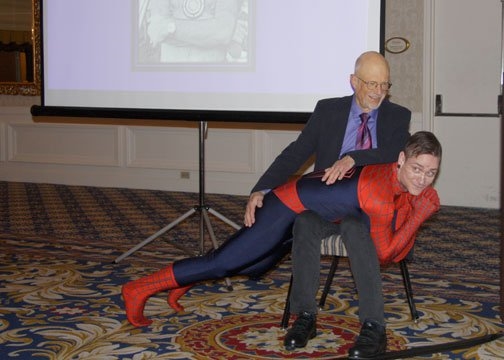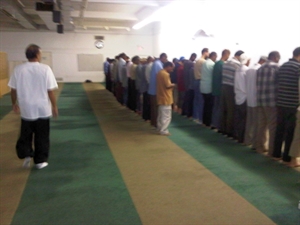International Body Piercing Day 2024 is on Friday, June 28, 2024: is it true you can paralyze yourself if you pierce your ear at the top in the wrong spot?
Friday, June 28, 2024 is International Body Piercing Day 2024. Holiday Jewelry :: BodyCandy Body Jewelry Blog celebrating the body piercing
As an Amazon Associate I earn from qualifying purchases.

15 Piercing Myths Exposed
by Amy Redd
The idea of paying someone to shove metal through your flesh might not rank very high on your To-Do list. However, it might jump up a few notches if you were able to separate the truth about the art of body piercing from certain myths floating around. While body piercing may not be for everyone, flawed preconceptions only heighten the reluctance of potential candidates to delve into this somewhat taboo area.
Even the pierced population can become confused by the fallacies running rampant through society. Misinformation leads to health hazards if a new piercing is improperly cared for. Whether you are in the market for a body piercing or not - don't believe everything you hear.
The Association of Professional Piercers - an international, non-profit group - dispenses health and safety information about body piercing. APP-certified professional piercer Randy Smyre at Pain & Wonder Tattoos and Body Piercing helps to dispel these hindering myths:
Piercings can cause paralysis. This is not an effect of the actual piercing procedure. If an infection is allowed to set in, and nothing is done about it, paralysis is only a possibility, Smyre says. He has never heard of it being a direct instantaneous result of a piercing. If piercings are properly cared for, it should not be a factor.
It is virtually impossible to blow your nose if you have a nose piercing. Rest assured that someone with a nose piercing is just as capable of blowing his or her nose as someone without this piercing. Unless the jewelry in the nose is extremely large and obstructive, Smyre says it does not affect the ability to blow your nose whenever the need should arise. Tara Newsome, a sophomore Linguistics and Spanish major from Augusta, has a total of 11 body piercings, including one in her nostril. She says the jewelry hasn't interfered with blowing her nose, and it merely took a little time to grow accustomed to. "Everybody asked me, 'How do you stand that?'" she says. "You just get used to it."
Drinking beer with a new oral piercing will cause a yeast infection to form in your mouth. This is false, but don't celebrate just yet. Drinking alcoholic beverages of any kind while a piercing heals, especially an oral piercing, is not recommended by the APP. It will destroy the newly formed skin tissue and cause unnecessary swelling, Smyre says. "The healthier your lifestyle, the easier it will be for your piercing to heal," according to the APP Web site (www.safepiercing.org).
Well at least there's nothing wrong with drinking a little alcohol before getting pierced. Wrong again. Aside from the excess bleeding and swelling alcohol would cause, Smyre says this also brings up an issue of poor judgment. "Drunk people are impossible to deal with," he adds. Those with alcohol in their system won't get pierced at Pain & Wonder.
If a certain vein in the tongue is accidentally pierced, you could bleed to death. There is surprisingly some amount of truth to this, though it is not nearly as alarming as it first appears. There is an arterial structure that, if pierced, can cause excessive bleeding (not necessarily death). It might not even be noticeable at first because the blood drains down the tongue, Smyre says. You would probably get sick and seek medical attention before you would even realize what actually happened. Technically this is a possibility, but it is extremely unlikely when dealing with a trained professional. Smyre says the tongue is not a very complex organ. To avoid such a situation, the piercer must simply pull back the tongue and check the location of this arterial structure before proceeding with the piercing.
Cleaning a piercing as many times a day as possible will ensure a faster healing time. While this might seem like common sense, over-cleaning is not better for a piercing. Piercings should be cleaned about twice daily and not more. Otherwise, you would just be removing healthy tissue cells, Smyre says. "Your body is doing the healing - you're not."
Turning jewelry randomly throughout the day during the healing process is a must. Contrary to popular belief, physically rotating jewelry in a piercing three or more times a day does nothing more than disturb the tissue as it heals, Smyre says. It breaks the tissue, forcing the healing process to start all over again. The APP notes that the only beneficial time to rotate jewelry within a piercing is when cleaning it twice a day, but it should not be turned at all during the first several cleanings.
Salt-water application is a natural way to heal a piercing. Mild sea salt-water soaks - not solutions made with table salt - should be applied to piercings during the healing process. Sea salts are preferred, because unlike regular salt, they do not contain iodine, which will only destroy the skin tissue, Smyre says. Sea salt-water solutions help to stimulate air and blood circulation, which facilitates healing, according to the APP.
Any bleeding, bruising, discoloration, or swelling that might occur during the healing process is a sure sign of infection. There is no need to jump to unnecessary conclusions. Smyre says these occurrences are not uncommon. They are part of the body's normal healing process and are not cause for alarm. The APP notes that any break in the skin, such as a new piercing, can bleed or bruise, but these are not indications of any complications.
If a piercing becomes infected, you should remove the jewelry immediately. If you want the skin to close up over the infection, resulting in an abscess (a localized collection of pus surrounded by an inflamed area), then this is the way to go - otherwise, this is not a good idea. Smyre says, once an abscess occurs, the infection will have to be surgically removed. He warns against taking out the jewelry of an infected piercing unless under the direction of a physician, and with the aid of antibiotics.
Alcohol, peroxide, or Betadine application is good for an infected piercing. While this was once considered a valid aftercare technique, it is no longer deemed an acceptable practice because it destroys new skin tissue. Smyre says you can actually watch skin cells explode underneath a microscope after being mixed with Betadine. All these substances are overly strong and dry out the skin, which can hinder healing, according to the APP.
If you have had a piercing for a while, you can take out the jewelry without fear of the hole closing up. If you're feeling lucky, then go ahead and take your chances. The amount of time necessary for a piercing to stay open without jewelry, however, just depends on the individual's body, Smyre says. He can find neither rhyme nor reason to this phenomenon. The APP warns that even older, well-healed piercings can shrink or close within minutes, even after being there for years. Earlobe piercings may stay open without jewelry, but that is no guarantee that other body piercings will as well. Newsome learned this lesson the hard way. She removed the jewelry from her barely-month old nose piercing to change it to a smaller size. When she tried to reinsert the jewelry, it would go no farther than halfway through the hole, and the area had to be repierced. "I only had it out like 45 seconds," she said. "It closed up really fast. It wasn't pretty."
Genital piercings are much more painful and prone to infection than other body piercings. Contrary to what the taboo nature of this piercing would suggest, this is typically not true. Smyre says genital piercings are generally very similar to other piercings. He does note, however, that certain genital piercings are more intense, partly because of the psychological fear that some individuals have about piercing these areas.
Piercing yourself is perfectly safe. Leave it to the professionals. Smyre says problems associated with this practice include the lack of adequate sterilization, a clean environment, and the proper tools. None of Newsome's piercings (nose, eyebrow, navel, earlobes or cartilage) were self-done. She intends to get more piercings, including her tongue, which she plans to have professionally done as well. "I'm addicted," she said.

Why does nobody talk about agent orange these days?
I'm going to assume that your are talking about the Syria chemical weapons, and the inherent hypocrisy of the US using Agent Orange in the Vietnam War.
I actually looked into something similar, when one of my contacts asked about depleted uranium. It seems that so far as international law is concerned, there's a sharp distinction between weapons that use their chemical reactions to kill, vs. those that have unintended side effects that may kill or harm.
In the case of depleted uranium, uranium is used because it is incredibly dense, meaning it makes excellent armor-piercing shells. The fact that it is radioactive is an unintended consequence, and so therefore it isn't classified as a chemical or atomic weapon.
I'm guessing that this applies to Agent Orange as well. It was meant as a defoliant so that any soldiers couldn't hide out in the jungle. It was not meant to be a human poison (though I have no idea whether or not its inventors knew of its human health effects). Therefore, it's not considered a chemical weapon.
Yeah I know, it's a bunch of legal maneuvering and hair-splitting, but that's the way the law is structured. But hey, there's plenty of hypocrisy to go around when it comes to war. White phosphorus bombs are also horrific, and what about the mass firebombing of civilians in WWII? Yes chemical weapons are terrible and should be banned, but unfortunately there are still many other ways to slaughter humans that are legal, and the bodies have been piling up in Syria long before chemical weapons were used.

where could i get a tattoing apprenticship in ni.ierland?
you'll have to have a stunning portfolio of your work (or drawings), a few grand as it'll take 2-3 years and you would be expected to purchase your own equipment and sterilising unit. it's simply about finding a decent tattooist who will basically take you under their wing and show you the ropes so to speak, working about 5-6 days a week with them with no wage.
there is 'tattoo academy's' but i haven't heard people giving them much praise..
there is also: The Body Arts College (BAC), but it's placed in london.
taken from their site: "a registered VTCT assessment centre offering the only approved International body piercing/tattooing qualification. We have enrolled students from many parts of the UK and deal with enquiries from Northern Ireland, Scotland, Wales and the Channel Islands as well as England."
does sound good though, eh? 25 quid or less to travel to there, and it'd be same as living in oul' northern ireland, only be english people instead.
good luck!













